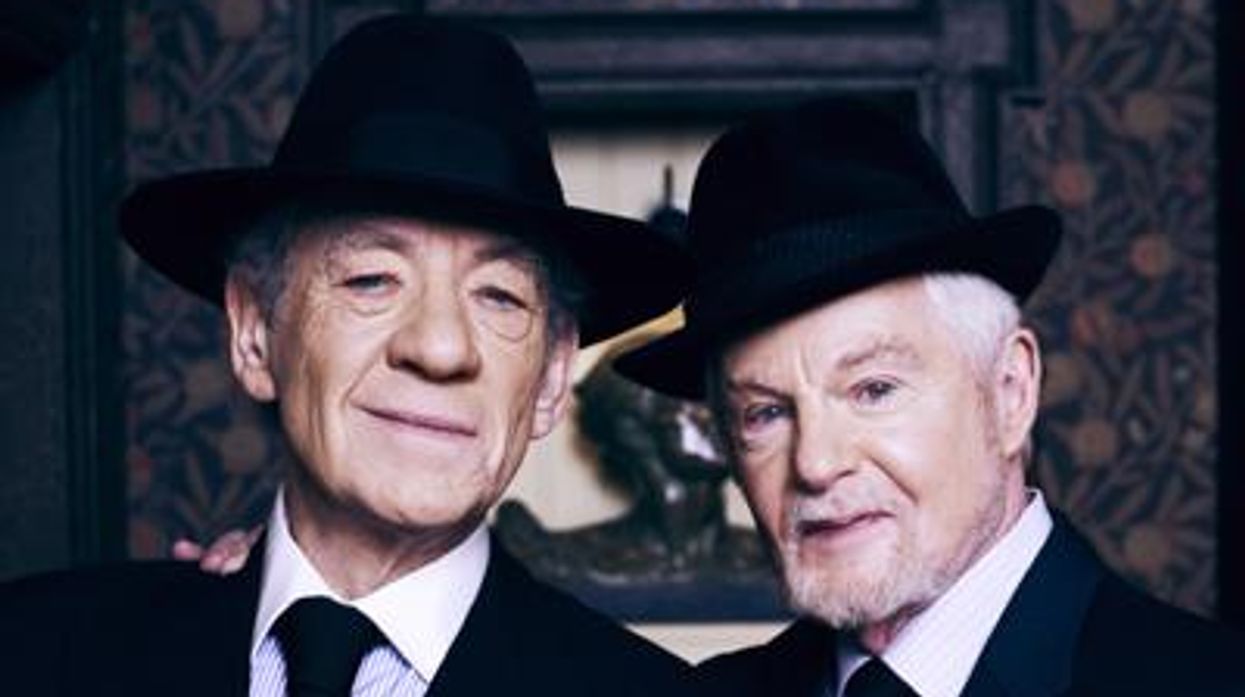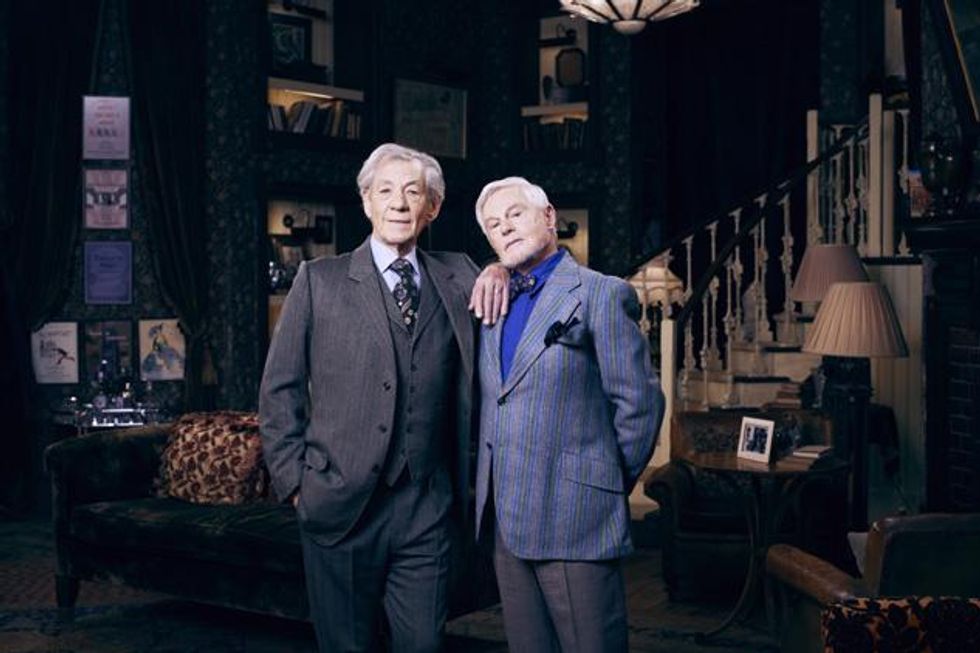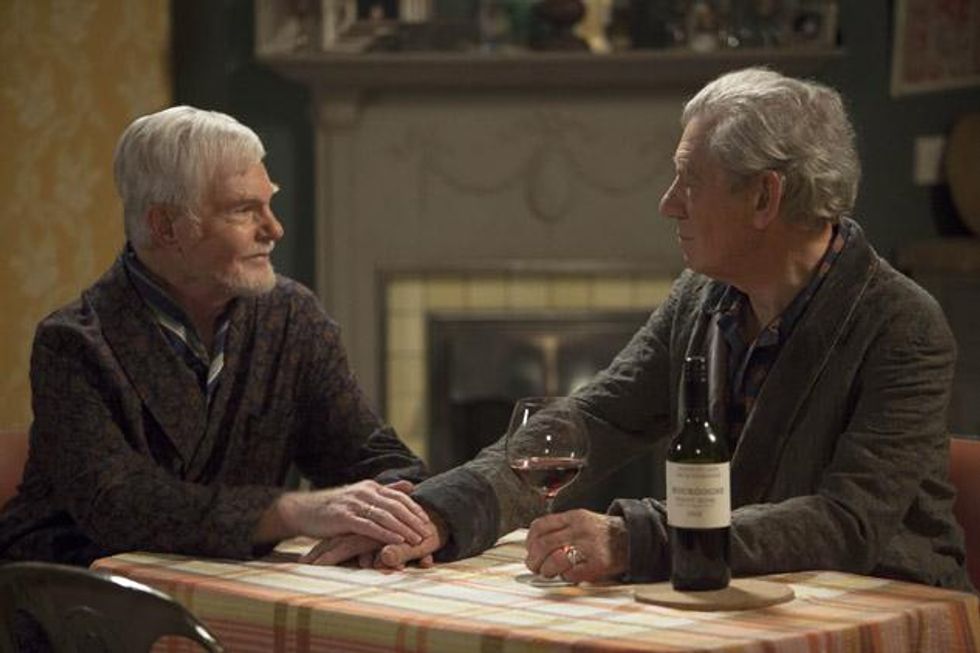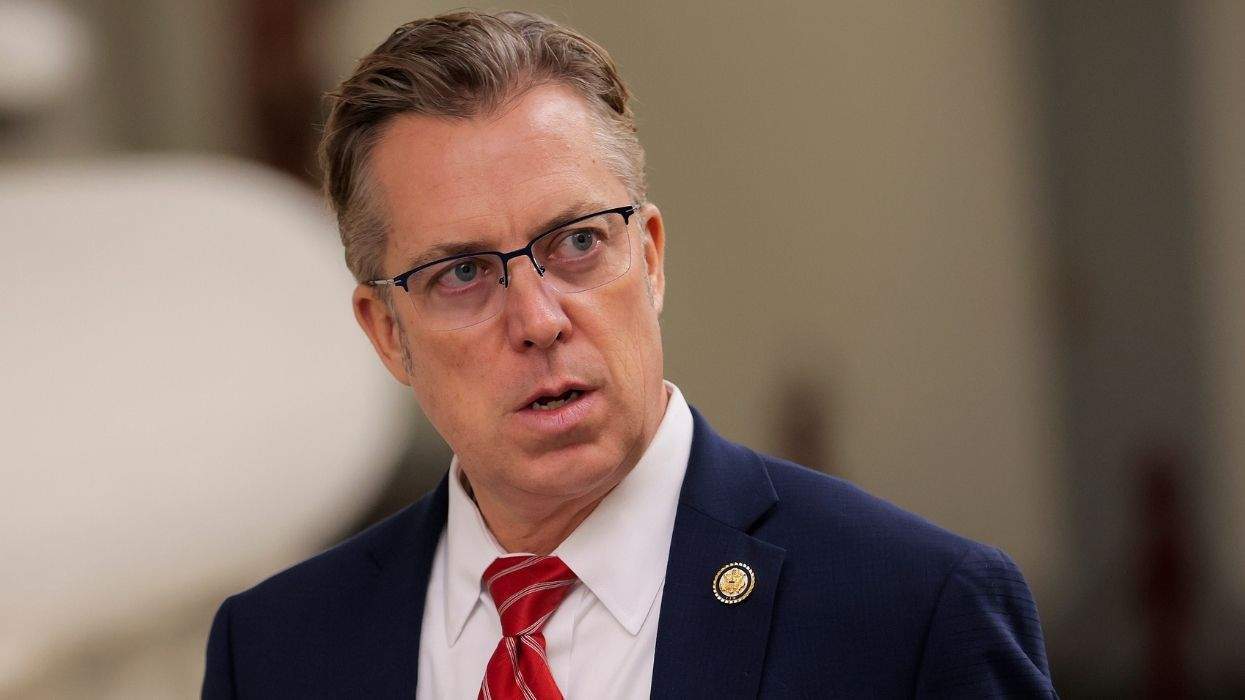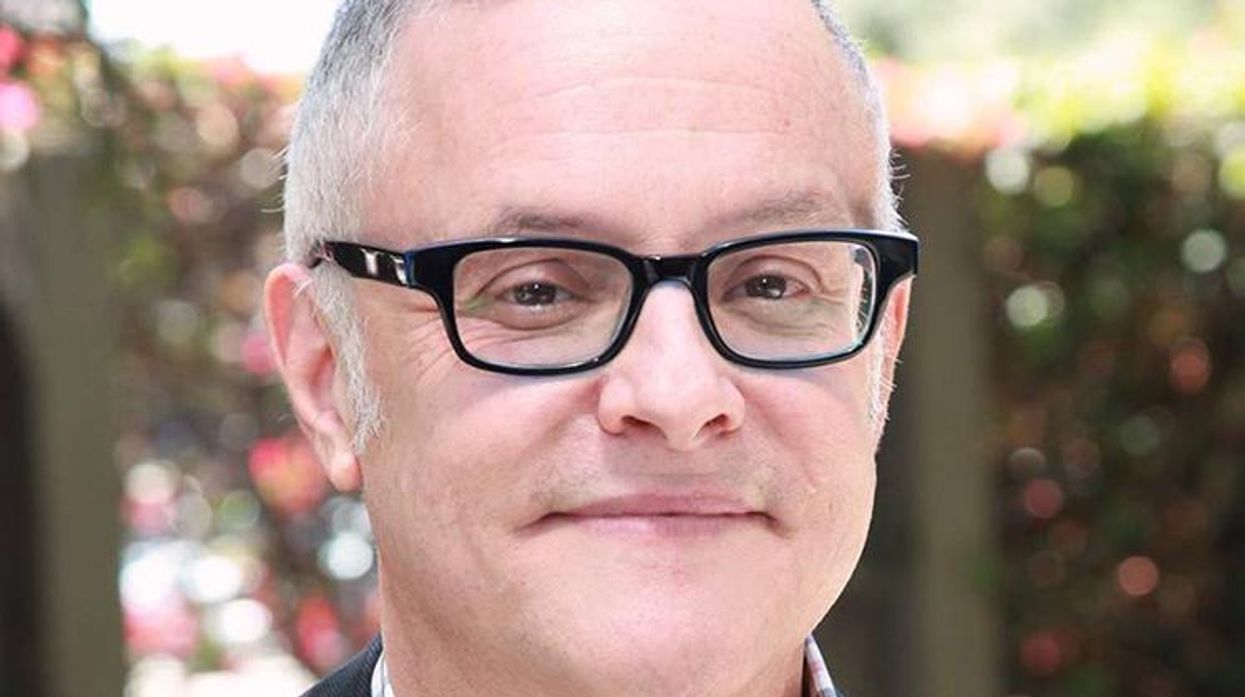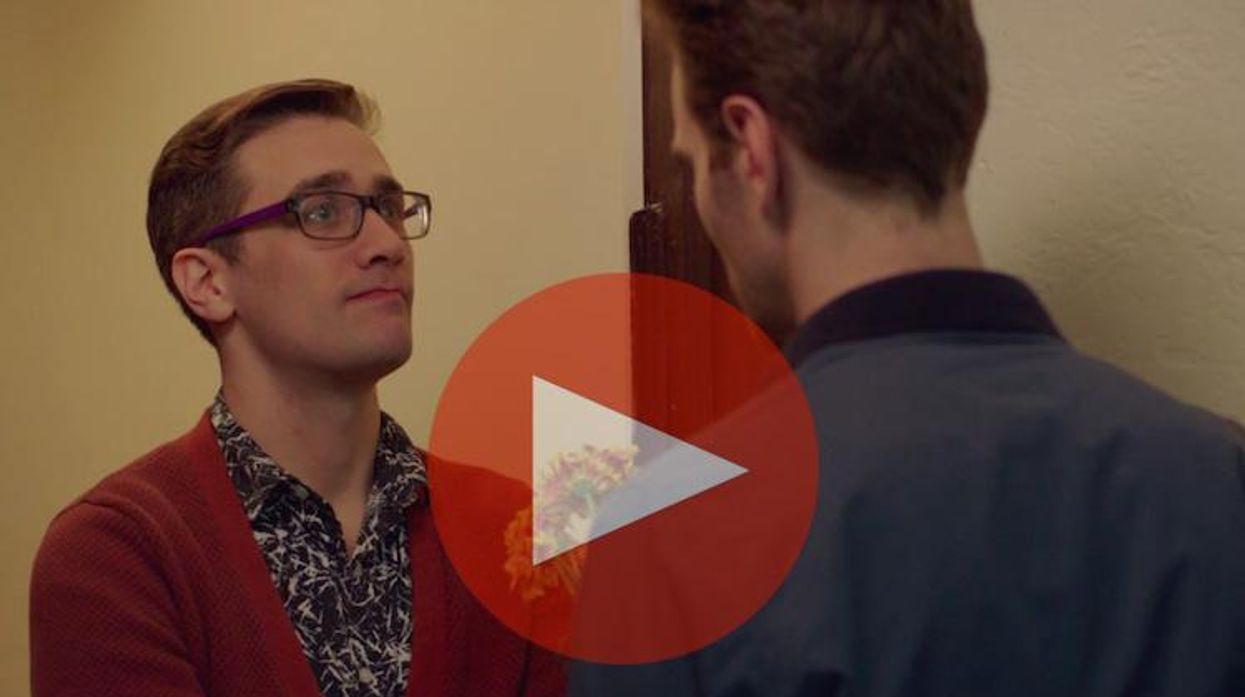To say Sir Ian McKellen's resume is impressive would be a gross understatement. Over a career spanning more than five decades, the actor has won accolades for roles in Shakespeare, been nominated twice for an Oscar -- the first time for Gods and Monsters and then for wowing audiences as the wizard Gandalf in the Lord of the Rings -- and he's even fought for mutant rights as Magneto in Marvel's X-Men. But at 75 years old, McKellen is happy to admit he's still trying new things.
With his role in the new British TV series Vicious, McKellen can now add a sitcom to his ever-expanding resume. The Britcom, which begins airing in the U.S. on PBS Sunday, tells the story of partners Freddie (McKellen) and Stuart (played by out actor Derek Jacobi) who have lived together for nearly 50 years in a small flat in central London. Though they spend most of their time firing off snide comments and picking each other apart, they also share a deep love that rests beneath the surface of their vicious exteriors.
"I was immediately attracted to doing a sitcom, as I've never done one before, and this sitcom was to be performed in front of a live audience in that old-fashioned way," says McKellen. "Then I was told that my partner was going to be played by Derek Jacobi. I was excited about that because, while we've known each other for over 50 years, we've scarcely worked together and we both agreed we wanted to do it."
He adds, pausing to chuckle before continuing, "I will say that I was a wee bit disappointed at first that the character I was going to play would be an actor of my own age and gay. I remember thinking, Oh, dear, this is going to be a little bit too close to home, but we had a reading of the first episode with friends and advisers and we all laughed so much, there didn't seem to be reason to resist."
While the series, which has already been renewed for a second season in the U.K., has received mostly positive reviews, a handful of people have voiced concern that the over-the-top flamboyance of the main characters reinforces old gay stereotypes. McKellen disagrees.
"I think there's been some confusion with people who've been critical of these exaggerated eccentrics that we're playing and worry we're going back to the stereotypical gays you would get in sitcoms 20 or 30 years ago. Well, the fact is these characters are different," he asserts. "These guys are out and have no problem with being gay. They're not hiding it. They're not making sly jokes about it. The comedy in this can be full-throated and you're not laughing at these guys, you're laughing with them, I hope. Of course, you'll observe that not much of this show advances gay rights, nor will we say that these two men are typical gay men. I certainly hope they're not. They behave outrageously at times, and yet it's amusing to watch because we understand them."
If anything, McKellen says, it's a sign that the gay movement is growing up.
"Today -- just as we've had sitcoms in the past about funny women, funny black people, funny young people, funny rich people, funny poor people, and funny people from the sticks -- there can now be sitcoms about two old men who are also gay," he says.
The simple fact that Freddie and Stuart are two older gay men was another reason McKellen joined Vicious. In addition to the series showcasing two gay leads, he says "it's rare for old people to be at the center of a story."
He said representations of aging LGBT people are sorely needed in entertainment to show young gay people they can lead fulfilling lives long after the age of 29.
Story continued on next page
Above: Ian McKellen and Derek Jacobi as Freddie and Stuart in Vicious
McKellen, who was born May 25, 1939 in Burnley, Lancashire, says he remembers sleeping "under a steel plate" until he was 4 years old. It was only later, a few years after World War II came to an end, that he not only realized war wasn't normal but that something was different about him as well.
"It was difficult growing up gay in England at that time," he says. "There was no sense of a community. There were no gay publications I could read, no gay books in the school library. There was no conversation about it anywhere. So it was just a confusing and a dreadful secret. "
When asked if he remembers the moment he was able to identify that he was gay and understood the ramifications of how he fit into society at that time, he pauses for a long moment, mulling the question over before saying, "When I grew up, attracted to people of my gender, I didn't say I was gay. We didn't use that word. The word was queer. And do I remember the moment where I said to myself, 'I'm queer?' I don't think I ever did say it, because I didn't feel I was queer. I thought I was perfectly normal. That didn't lead me to start sticking up for myself at a time when having sex with another man was illegal and you could be put in prison for it. So there were all sorts of reasons for not identifying, even to yourself, what you were."
Despite the barren landscape of gay role models at the time, McKellen says he had things "well figured out" by his mid-teens and soon acted on his feelings with other men. Though he didn't speak publicly about his sexuality, he says he never truly felt as though he was ever in the closet.
"My boyfriends and I were always out in public and there wasn't anybody who I met who didn't know that I was gay, but I hadn't come out to my family, nor had I ever talked to the press about it," he says. "One of the reasons why was I thought I wouldn't be allowed to play a certain person. Now that I'm gay they'll expect me to play a gay part."
However, McKellen adds he was pleasantly surprised to find after coming out his career took a different path than the one he feared.
"By the time I came out, I was 49. I was well established and it was no surprise to anyone I had ever worked with. Things carried on as normal," he says. "But what's gratifying is that audiences, like I do, don't give a damn about the sexuality of an actor. What they're interested in is the performance. If they have some fantasy about an actor, then that's what it is -- fantasy. You can have fantasies about somebody whether they're gay or straight, bisexual, transgender, whatever. So it's perfectly possible for a straight actor to successfully play a gay man and it's equally possible for me to play all sorts of straight men like Hamlet, Macbeth, Coriolanus, and King Lear. After all, I wouldn't want to cut myself off from that fascinating phenomenon of heterosexuality."
The actor, who was knighted in 1991 for his service to the performing arts, says he feels an obligation to be as visible as he can to prove that the hazards of coming out as an LGBT person working in entertainment are quickly becoming a thing of the past.
"I'm sure the advice still goes to young actors, saying it would be better if you don't come out. But I say it will be a great deal worse if you don't come out because you'll have a miserable, complicated life," he asserts. "Frankly, if you feel like you're in a business where you have to remain in the closet, my advice would be to get out of that business."
Story continued on next page
Above: Stuart (Derek Jacobi) and Freddie (Ian McKellen) share an affectionate moment in the first episode of Vicious.
McKellen says he hoped to have the opportunity to provide a beacon of hope for LGBT youth and entertainers who felt trapped in the closet in another way after he had received an Academy Award nomination for Best Actor in 1998 for his role as James Whale in the critically acclaimed film Gods and Monsters.
"I had in the pocket of my tuxedo that night, a speech which began, 'I'm proud to be the first openly gay actor to ever get an Oscar,'" he recalls. "But alas, it wasn't my turn. Nor has anyone else since been able to say that. So we're still waiting for the first openly gay actor to pick up their Oscar."
In addition to being an out and visible gay man, McKellen continues to be a driven advocate for LGBT rights, lending his voice and celebrity to a number of equality campaigns and causes throughout the world. It's a passion he says won't be dying down any time soon.
"I suppose I'm making up for those early years, the first half of my life, when I didn't talk about it," he says as his voice takes on a happy, lilting quality. "And if you don't talk about being gay, you don't get to meet other gay people. You're not a citizen of the world. The connections you immediately make once you come out, sharing coming-out stories, for example, is one of the good things about being gay. We all have that in common. We have to come out whether we live in Russia or Africa, the States or the United Kingdom. So I'm very happy to keep telling people I'm gay, because being out, that's what changes the world."
Though he's pleased with the general reception of Vicious, McKellen says he has specific goals in mind for "getting it better" when he returns for the show's second season. "There's lots about my own performance that needs attention," he admits. "It was particularly difficult for me to work out how to play to an audience of 500 people who are in the studio with us and play more subtly to the camera, which is where the vast majority of the audience is. I think there's a level of playing that I'm interested in getting right [this time]."
He also says he's looking forward to the further development of the show's two main characters and hopes viewers will keep in mind that Freddie and Stuart are from a different generation.
"They're gays of their age and they had to battle through it," he says. "When they were young men they could have been in prison for having sex. So they're survivors and they battled through by sticking with each other. Maybe part of the viciousness they use is some resentment, but that was the only life that was open to them."
"Still," he adds, "I do hope there will be more signs of modern gay life in this series, and I've heard hints that the characters are going to be getting out of the house a bit more, and I like that. After all, living an open life, that's what was inspired by drag queens and so many others at the Stonewall riots 45 years ago. And that spirit, we should all live."
